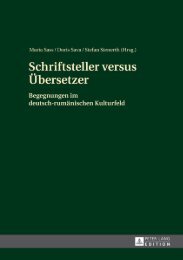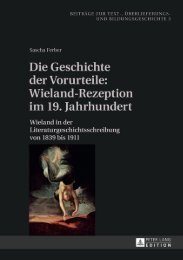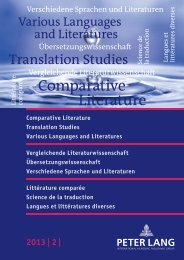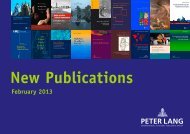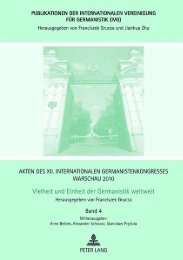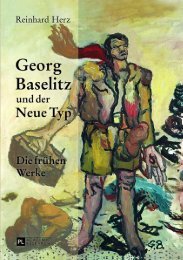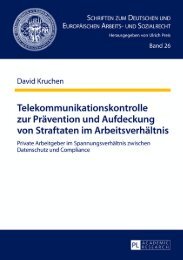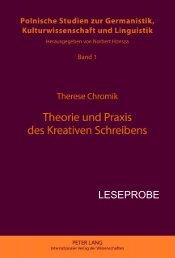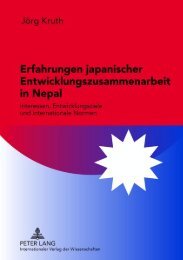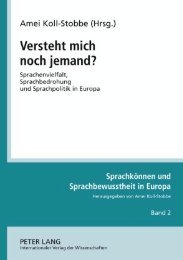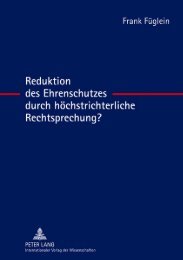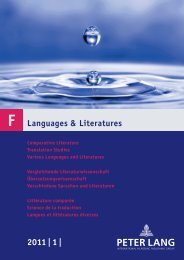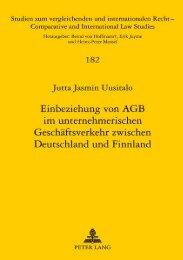Erfolgreiche ePaper selbst erstellen
Machen Sie aus Ihren PDF Publikationen ein blätterbares Flipbook mit unserer einzigartigen Google optimierten e-Paper Software.
W<br />
hat are the points of contact between<br />
the study of language and the study<br />
of history? What are the possibilities for collaboration<br />
between linguists and historians,<br />
and what prevents it? This volume, the proceedings<br />
of an international conference held<br />
at the University of Bristol in April 2009,<br />
presents twenty-two articles by linguists and<br />
historians, exploring the relationship between<br />
the fields theoretically, conceptually<br />
and in practice . Contributions focus on a variety<br />
of European and American languages,<br />
in historical periods from the Middle Ages<br />
to the present day . Key themes at the intersection<br />
of these two disciplines are the standardization<br />
and classification of languages,<br />
the social and demographic history of medieval<br />
and early modern Europe, the study of<br />
language and history ‘from below’, and the<br />
function of language in modern politics . The<br />
value of interdisciplinary collaboration is<br />
demonstrated in a wide-ranging set of case<br />
studies, on topics including language contact<br />
in Northern and Central Europe, the relationship<br />
between peninsular and transatlantic<br />
Spanish, and new approaches to the<br />
recent histories of Nicaragua, Luxembourg<br />
and Bulgaria . The volume seeks out the interdependencies<br />
between the two fields and<br />
asks why exchanges between linguists and<br />
historians remain the exception rather than<br />
the rule .<br />
Contents: Steffan Davies/Nils <strong>Lang</strong>er/<br />
Wim Vandenbussche: <strong>Lang</strong>uage and History,<br />
Linguistics and Historiography: Interdisciplinary<br />
Problems and Opportunities • Patrick<br />
Honeybone: History and Historical Linguistics:<br />
Two Types of Cognitive Reconstruction?<br />
• Nicholas M . Wolf: History and Linguistics:<br />
Download Catalogues<br />
Nils <strong>Lang</strong>er • Steffan Davies •<br />
Wim Vandenbussche (eds)<br />
<strong>Lang</strong>uage and History, Linguistics<br />
and Historiography<br />
Interdisciplinary Approaches<br />
Oxford, Bern, Berlin, Bruxelles, Frankfurt am Main, New York, Wien, 2012 .<br />
XII, 503 pp ., num . fig . and tables<br />
Studies in Historical Linguistics . Vol . 9<br />
Edited by Graeme Davis, Karl A . Bernhardt and Mark Garner<br />
pb . ISBN 978-3-0343-0761-1<br />
CHF 81 .– / € D 61 .70 / € A 63 .50 / € 57 .70 / £ 52 .– / US-$ 86 .95<br />
The Irish <strong>Lang</strong>uage as a Case Study in an Interdisciplinary<br />
Approach to Culture • Brian D .<br />
Joseph: Historical Linguistics and Sociolinguistics:<br />
Strange Bedfellows or Natural<br />
Friends? • Nicola McLelland: From Humanist<br />
History to Linguistic Theory: The Case of<br />
the Germanic Rootword • Agnete Nesse: Editorial<br />
Practices and <strong>Lang</strong>uage Choice: ‘Low<br />
German <strong>Lang</strong>uage Monuments’ in Norway •<br />
Robert Evans: Official <strong>Lang</strong>uages: A Brief Prehistory<br />
• Tomasz Kamusella: Classifying the<br />
Slavic <strong>Lang</strong>uages, or the Politics of Classification<br />
• José del Valle: Linguistic History and<br />
the Development of Normative Regimes: The<br />
Royal Spanish Academy’s Disputed Transatlantic<br />
Authority • Juan R . Valdez: Colouring<br />
<strong>Lang</strong>uage: Pedro Henríquez Ureña’s Representations<br />
of Spanish and Dominican Identity<br />
• Laura Villa: ‘Because When Governments<br />
Speak, They Are Not Always Right’: National<br />
Construction and Orthographic Conflicts in<br />
Mid-Nineteenth-Century Spain • Gijsbert<br />
Rutten /Rik Vosters: As Many Norms as There<br />
Were Scribes? <strong>Lang</strong>uage History, Norms and<br />
Usage in the Southern Netherlands in the<br />
Nineteenth Century • Anneleen Vanden Boer:<br />
<strong>Lang</strong>uage and Nation: The Case of the German-<br />
Speaking Minority in Belgium • Richard<br />
Ingham: The Decline of Bilingual Competence<br />
in French in Medieval England: Evidence from<br />
the PROME Database • Rembert Eufe: Merov-<br />
ingian Coins and Their Inscriptions: A Chal-<br />
lenge to Linguists and Historians • Remco<br />
Knooihuizen: The Use of Historical Demog-<br />
raphy for Historical Sociolinguistics: The Case<br />
of Dunkirk • Judith Nobels/Marijke van der<br />
Wal: Linking Words to Writers: Building a Re-<br />
liable Corpus for Historical Sociolinguistic<br />
Research • Helmut Graser/B . Ann Tlusty: Six-<br />
Download catalogues from our website at<br />
www.peterlang.com/downloads<br />
Histoire · Geschichte · History<br />
teenth-Century Street Songs and <strong>Lang</strong>uage<br />
History ‘From Below’ • Juan Manuel Hernández-<br />
Campoy: Mood Distinction in Late Middle Eng-<br />
lish: The End of the Inflectional Subjunctive •<br />
Lisa Carroll-Davies: Identifying the Enemy: Us-<br />
ing a CDA and Corpus Approach to Analyse<br />
Sandinista Strategies of Naming • Krassimir<br />
Stoyanov: Ritualized Slogan Lexis in the Bul-<br />
garian Press during the Times of Violent Con-<br />
tradiction in Ideologies (1944-1947) • Kristine<br />
Horner/Melanie Wagner: Remembering World<br />
War II and Legitimating Luxembourgish as<br />
the National <strong>Lang</strong>uage: Consensus or Conflict?<br />
• Michela Giordano/Federica Falchi:<br />
John Stuart Mill and Salvatore Morelli: <strong>Lang</strong>uage<br />
as a Social Tool in Nineteenth-Century<br />
Britain and Italy .<br />
nils langer is Reader in German Linguistics<br />
at the University of Bristol . His primary<br />
research interests lie in the area of historical<br />
sociolinguistics and he is currently<br />
working on language contact in Schleswig-<br />
Holstein in the nineteenth century .<br />
steFFan davies is Lecturer in German at<br />
the University of Bristol . He studied History<br />
and German at the University of Oxford, writing<br />
his doctoral thesis on the literary, cultural<br />
and historiographical treatment of Albrecht<br />
von Wallenstein in the ‘long nineteenth century’<br />
.<br />
wim vandenBussChe is Professor of<br />
Dutch Linguistics at the Vrije Universiteit<br />
Brussel . He teaches courses on Dutch and<br />
Germanic language history, as well as on various<br />
aspects of sociolinguistics . His research<br />
is situated in the domain of historical sociolinguistics,<br />
with particular attention to the<br />
language situation in Flanders during the<br />
eighteenth and nineteenth centuries .<br />
Our complete backlist is available at www.peterlang.com<br />
7



